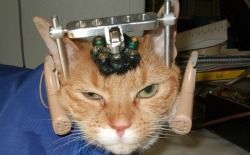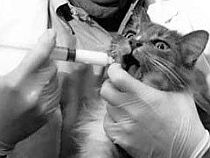Animal Cruelty -- Animal Testing
This page is but a brief overview and includes commentary.
Global Digest has a more detailed and comprehensive section:
Animal Cruelty -- Animal Testing.
U.S. Government Animal Research
- The Cruelty of Lab Animal Testing
- ANIMAL CRUELTY IN RESEARCH LABS

- NEAVS: New England Anti-Vivisection Society
- Speak Out for Species (S.O.S.) - Protecting Animals from Cruelty, Abuse, and Exploitation
- Animal Rights Action: Raising Awareness
- IFAW: International Fund for Animal Welfare
Founded in 1969, IFAW saves individual animals, animal populations and habitats all over the world.
- PAWS - People Helping Animals
- World Animal Foundation
One popular method of procuring chimpanzees (primates) for outfits like Covance [the single largest importer of primates for research purposes in the United States] is to find a mother with a clinging baby in the jungle trees, shoot the mother, then retrieve the baby still holding on to his dead mother.
- PETA | People for the Ethical Treatment of Animals
"Each year, tens of millions of individual cats, dogs, monkeys, and other animals are subjected to barbaric and crude procedures at corporate, government, and university laboratories across North America. Most are eventually killed."
- Which is the safest country for animals? - Global Public Square
"The U.S. Animal Welfare Act (AWA) does not prohibit any experiment, no matter how cruel or irrelevant. It simply sets minimum housing and maintenance standards for confined animals."
- Imprisoned and Poisoned at SNBL: A Whistleblower Case
A distraught whistleblower from Shin Nippon Biomedical Laboratories (SNBL), a notorious Everett, Washington-based animal testing conglomerate, contacted PETA to reveal shocking allegations of mistreatment of animals used in painful and lethal experiments.
PETA saves 70 beagles headed for cruel testing lab.
"The young dogs were headed for a laboratory where they were slated to endure cruel toxicity tests in which they would be injected with or force-fed chemicals, experimental drugs, and pesticides in increasingly higher doses until they became very sick or died."
PETA also discovered that the notorious laboratory breeder that sold the dogs, Marshall Biotechnology (a subsidiary of U.S.-based Marshall BioResources), lied to the airline transporting the beagles from China to India, stating in a letter that "they ... won't be hurt or killed as Lab Animal."
Nature News Blog: Breaking news from the world of science
 PETA reveals photos of horrific cruelty in a University of Wisconsin-Madison laboratory, where for years, experimenters have tormented and killed cats for a taxpayer-funded experiment.
PETA reveals photos of horrific cruelty in a University of Wisconsin-Madison laboratory, where for years, experimenters have tormented and killed cats for a taxpayer-funded experiment.
Investigation Reveals Hell on Earth for Animals at California Dealer's Warehouse | PETA
Essay
Letter to the Editor
I'm trying to help bring awareness of cruelty to and unnecessary experimentation on animals to the minds of everyone everywhere. Correcting the problem of their treatment isn't simply one of perceiving animals as having intrinsic worth as living beings, as individuals of some other species. In general, that's probably how most people feel; nonetheless, that appreciation is of little consequence when compared to their serviceability to humanity. Given that as the case, in the name of research--for the good of humanity--an animal's worth can be, and usually is, relegated to the level of inanimate object with but a single purpose: What can be learned of practical significance by using it as a test subject?
No, the current problem with regard to using animals as experimental fodder, to be euthanized and cast away afterwards, is that it's become an ingrained habit, a custom, part of the methodology of science and what passes for science, like testing cosmetics and household goods on living things. There are alternatives, especially now in the golden age of computer simulations and live tissue fabrication, to that tradition which, I believe, would be implemented if enough people knew about the situation and cared about animals. Knowledge and understanding and empathy and action. Laws need to be passed. In China, for example, it's required by law to test cosmetics on animals. I think we're better than that.
 Baldly stated, after 20 years of commercial fishing, mostly in Alaska, I've become somewhat inured to harsh conditions. That lifestyle not only toughens a person physically and mentally, naturally enough, but can also be emotionally desensitizing. That being said, however, I find the procedures performed on animals in the name of research and the mistreatment of farm animals, especially on corporate farms, deeply disturbing. And I find it simply incredulous that such practices are perfectly legal in our country and through most of the rest of the civilized world.
Baldly stated, after 20 years of commercial fishing, mostly in Alaska, I've become somewhat inured to harsh conditions. That lifestyle not only toughens a person physically and mentally, naturally enough, but can also be emotionally desensitizing. That being said, however, I find the procedures performed on animals in the name of research and the mistreatment of farm animals, especially on corporate farms, deeply disturbing. And I find it simply incredulous that such practices are perfectly legal in our country and through most of the rest of the civilized world.
"Worldwide it is estimated that the number of vertebrate animals—from zebrafish to non-human primates—ranges from the tens of millions to more than 100 million used annually. Invertebrates, mice, rats, birds, fish, frogs, and animals not yet weaned are not included in the figures in the United States; one estimate of mice and rats used in the US alone in 2001 was 80 million." [Wikipedia]
In order to test the efficacy and side-effects of some experimental drug, including determination as to what constitutes a lethal overdose--usually accompanied by excrutiating pain--they first give the animal--a dog, cat, chimpanzee--the disease in question, then, at various stages of drug development and degree of disease, watch what transpires. If they've gone off on a tangent and the effects are detrimental, they backtrack and start again, euthanizing the animal, or animals, tested upon and grabbing a fresh batch, as though they were merely inanimate expendable things.
Testing of household products on animals--will this particular bleach or solvent cause blindness, skin blisters? What happens when this or that pesticide or toxic ingredient is ingested?--goes unnoticed. And even though it's completely unnecessary--given today's alternatives--the cosmetics industry continues to test products using animals.
 Here's what I see. This practice of using animals to experiment on, either for behavioral and physiological research or to test products, medicinal or otherwise, began during World War II. At that time, the Germans had no compunction about using human beings, against their will, of course, as experimental fodder. People knew this. The stinging shock of it desensitized researchers and people at large into accepting, without much conscience, experimentation on lower animals.
Here's what I see. This practice of using animals to experiment on, either for behavioral and physiological research or to test products, medicinal or otherwise, began during World War II. At that time, the Germans had no compunction about using human beings, against their will, of course, as experimental fodder. People knew this. The stinging shock of it desensitized researchers and people at large into accepting, without much conscience, experimentation on lower animals.
Ancient Rome was the most sophisticated of societies, it represented the gold standard for civilization per se--we are taught--yet the Roman populace enjoyed watching gladiators fight to the death and people torn to pieces by lions. During the period of the Inquisition, the Church's authority was absolute and unrivaled. Suffusing all political systems in Europe, its rule was the ultimate expression of western civilization. As such, it realized new heights in imaginative ways to torture and kill people. And, without objection, before or after, Thomas Edison publically electrocuted an elephant, who suffered horribly, as one might expect, in order to demonstrate the power and efficiency of his DC current. Nowadays, none of the above would be allowed, at least not in any healthy society; our collective moral consciousness has evolved, grudgingly and in fits and starts perhaps, but evolved nonetheless.
However, experimenting on animals has not only continued, but has spread throughout the world, increasing exponentially. Is it because it's done behind closed doors? Out of sight? I think so. The cries and squeals and suffering of so many animals kept muffled and hidden can't possibly play on our conscience or our heartstrings. How would civilization progress? If we bother to contemplate lab animals at all, their plight is justified by an occasional breakthrough in a pharmaceutical product or genetic discovery, by the determination of something detrimental to our health at the cost of some animal's life.
 It became accepted and tacitly approved by the public sixty to seventy years ago and since then has been routinely ingrained in our mind, part of the socialization process. But I believe unneccesarily treating animals with such cold-hearted contempt does our humanity no service, and its utility needs to be revisited. In truth, given today's computer capabilities compared to the Turing machines of World War II vintage, experimenting on animals is an anachronism, and may very well be holding back research and beneficial breakthroughs.
It became accepted and tacitly approved by the public sixty to seventy years ago and since then has been routinely ingrained in our mind, part of the socialization process. But I believe unneccesarily treating animals with such cold-hearted contempt does our humanity no service, and its utility needs to be revisited. In truth, given today's computer capabilities compared to the Turing machines of World War II vintage, experimenting on animals is an anachronism, and may very well be holding back research and beneficial breakthroughs.
"Four states in the U.S. — Minnesota, Utah, Oklahoma, and Iowa — require their shelters to provide animals to research facilities. Fourteen states explicitly prohibit the practice, while the remainder either allow it or have no relevant legislation." [Wikipedia] Of the fourteen states prohibiting such practice, I find it curious that, except for Hawaii, no state is farther west than Pennsylvania. Do you know the policy of your local animal shelter with regard to selling dogs and cats to research facilities?
When I read the material and look at the pictures, I'm pushed back, stunned by disbelief. There's this whole other world going on, outside of normal, where such practices are not only legitimized and justified, but also publically and governmentally supported and sanctioned. Just looking at the home page of a major "biomedical resource supplier" like Marshall BioResources sends a chill down the spine. On the left side is a looping slideshow of a beagle, a mongrel, and a ferret. Focusing on that alone--apart from the context--one gets the impression of an animal rescue operation or shelter trying to find loving homes for its residents, not an international breeding company with global facilities displaying its merchandise to prospective customers to be used for experimentation purposes.
 No one's supposed to raise an eyebrow; it's all quite ordinary and conventionally accepted; morality and empathy have no place--it's how things are done! How else are we supposed to test pharmaceuticals? Don't you want vaccines and drugs developed to help people? Of course I want chronic ailments and conditions controlled and, where possible, diseases eradicated; nonetheless, there are alternatives to torturing animals. Unfortunately, there's little will or incentive to employ them or to discover new ones. And as far as non-biomedical research using animals goes, it's completely unjustifiable. Surely there must be a way to determine a particular cosmetic, shampoo, or soap's irritability without sticking it into the eyes of some hapless animal (rabbit, cat, dog) to see what happens. Jesus.
No one's supposed to raise an eyebrow; it's all quite ordinary and conventionally accepted; morality and empathy have no place--it's how things are done! How else are we supposed to test pharmaceuticals? Don't you want vaccines and drugs developed to help people? Of course I want chronic ailments and conditions controlled and, where possible, diseases eradicated; nonetheless, there are alternatives to torturing animals. Unfortunately, there's little will or incentive to employ them or to discover new ones. And as far as non-biomedical research using animals goes, it's completely unjustifiable. Surely there must be a way to determine a particular cosmetic, shampoo, or soap's irritability without sticking it into the eyes of some hapless animal (rabbit, cat, dog) to see what happens. Jesus.
See:
Say What!
During my research I ran across statements that were mind numbing. For instance, an experimenter openly admitted that the reason beagles are preferred to other dog breeds is because their docility and trusting natures (exact words) make them easy to work with.



 PETA reveals
PETA reveals  Baldly stated, after 20 years of commercial fishing, mostly in Alaska, I've become somewhat inured to harsh conditions. That lifestyle not only toughens a person physically and mentally, naturally enough, but can also be emotionally desensitizing. That being said, however, I find the procedures performed on animals in the name of research and the mistreatment of farm animals, especially on corporate farms, deeply disturbing. And I find it simply incredulous that such practices are perfectly legal in our country and through most of the rest of the civilized world.
Baldly stated, after 20 years of commercial fishing, mostly in Alaska, I've become somewhat inured to harsh conditions. That lifestyle not only toughens a person physically and mentally, naturally enough, but can also be emotionally desensitizing. That being said, however, I find the procedures performed on animals in the name of research and the mistreatment of farm animals, especially on corporate farms, deeply disturbing. And I find it simply incredulous that such practices are perfectly legal in our country and through most of the rest of the civilized world.  Here's what I see. This practice of using animals to experiment on, either for behavioral and physiological research or to test products, medicinal or otherwise, began during World War II. At that time, the Germans had no compunction about using human beings, against their will, of course, as experimental fodder. People knew this. The stinging shock of it desensitized researchers and people at large into accepting, without much conscience, experimentation on lower animals.
Here's what I see. This practice of using animals to experiment on, either for behavioral and physiological research or to test products, medicinal or otherwise, began during World War II. At that time, the Germans had no compunction about using human beings, against their will, of course, as experimental fodder. People knew this. The stinging shock of it desensitized researchers and people at large into accepting, without much conscience, experimentation on lower animals. It became accepted and tacitly approved by the public sixty to seventy years ago and since then has been routinely ingrained in our mind, part of the socialization process. But I believe unneccesarily treating animals with such cold-hearted contempt does our humanity no service, and its utility needs to be revisited. In truth, given today's computer capabilities compared to the Turing machines of World War II vintage, experimenting on animals is an anachronism, and may very well be holding back research and beneficial breakthroughs.
It became accepted and tacitly approved by the public sixty to seventy years ago and since then has been routinely ingrained in our mind, part of the socialization process. But I believe unneccesarily treating animals with such cold-hearted contempt does our humanity no service, and its utility needs to be revisited. In truth, given today's computer capabilities compared to the Turing machines of World War II vintage, experimenting on animals is an anachronism, and may very well be holding back research and beneficial breakthroughs. No one's supposed to raise an eyebrow; it's all quite ordinary and conventionally accepted; morality and empathy have no place--it's how things are done! How else are we supposed to test pharmaceuticals? Don't you want vaccines and drugs developed to help people? Of course I want chronic ailments and conditions controlled and, where possible, diseases eradicated; nonetheless, there are alternatives to torturing animals. Unfortunately, there's little will or incentive to employ them or to discover new ones. And as far as non-biomedical research using animals goes, it's completely unjustifiable. Surely there must be a way to determine a particular cosmetic, shampoo, or soap's irritability without sticking it into the eyes of some hapless animal (rabbit, cat, dog) to see what happens. Jesus.
No one's supposed to raise an eyebrow; it's all quite ordinary and conventionally accepted; morality and empathy have no place--it's how things are done! How else are we supposed to test pharmaceuticals? Don't you want vaccines and drugs developed to help people? Of course I want chronic ailments and conditions controlled and, where possible, diseases eradicated; nonetheless, there are alternatives to torturing animals. Unfortunately, there's little will or incentive to employ them or to discover new ones. And as far as non-biomedical research using animals goes, it's completely unjustifiable. Surely there must be a way to determine a particular cosmetic, shampoo, or soap's irritability without sticking it into the eyes of some hapless animal (rabbit, cat, dog) to see what happens. Jesus.